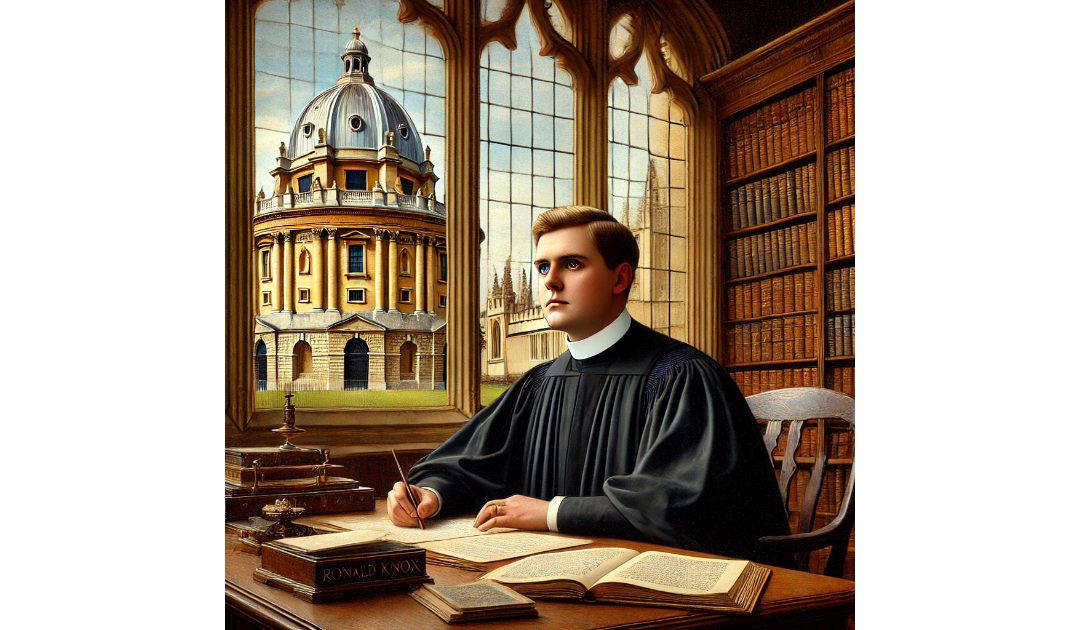Today I had the horrible feeling that in The Favourite Murder, my work in progress and the fifth book of the Sir Anthony Standen Adventures, I might have broken one of Ronald Knox’s famous Ten Commandments of Detective Fiction. I checked them, and I’m happy to say that I have not. But it made me want to know a little more about Ronald Knox.
Ronald Knox was an influential English priest, theologian, and author, known for his contributions to both detective fiction and Catholic apologetics. He was born on February 17, 1888, in Kibworth, Leicestershire, England, and died on August 24, 1957, in Mells, Somerset. Knox’s diverse career spanned writing, religious scholarship, and broadcasting, leaving a lasting impact in multiple fields.
Ronald Arbuthnott Knox was the son of Edmund Arbuthnott Knox, an Anglican bishop, and his wife Ellen Penelope. He grew up in a devoutly Christian household, which strongly influenced his early religious and intellectual development. Knox was a brilliant student, attending Eton College and then Balliol College, Oxford. At Oxford, he excelled academically, especially in the study of Classics. He became known for his wit, intellect, and oratory skills.
Initially ordained as an Anglican priest in 1912, Knox’s theological journey led him to convert to Roman Catholicism in 1917. This was a significant decision, especially given his father’s prominent role in the Anglican Church. After his conversion, Knox was ordained as a Catholic priest in 1918. His shift to Catholicism was influenced by his intellectual exploration of Christian doctrine and a growing disillusionment with Anglicanism’s lack of doctrinal authority.
Knox was a founding member of the Detection Club, alongside luminaries like Agatha Christie and Dorothy L. Sayers. He is renowned for his detective novels, especially The Viaduct Murder (1925) and The Three Taps (1927). Knox’s detective fiction adhered to the fair play principle, meaning that readers had all the clues necessary to solve the mystery themselves.
He famously wrote the Ten Commandments of Detective Fiction (also known as Decalogue) in 1929, a set of rules for writing detective stories to ensure fair play and avoid common clichés. These commandments became highly influential among mystery writers.
Knox was also a prolific writer of theological and devotional texts. Some of his notable works include: The Belief of Catholics (1927), an apologetic work defending Catholic doctrine, and Enthusiasm (1950), a historical study of religious enthusiasm and its extremes, exploring various Christian movements over the centuries. He was a master of satire, as seen in Let Dons Delight (1939), a fictional dialogue spanning centuries, reflecting changes in intellectual thought.
Knox is particularly celebrated for his translation of the Bible into contemporary English, known as the Knox Bible. Commissioned by the Catholic Church, it was completed in 1945. Knox’s translation aimed to strike a balance between readability and fidelity to the Latin Vulgate, becoming widely used in Catholic circles before the advent of modern translations like the Jerusalem Bible.
In 1926, Knox gained notoriety for a BBC radio broadcast that parodied a live news report of an anarchist riot in London, which many listeners mistook for a real event. This incident foreshadowed Orson Welles’s infamous War of the Worlds broadcast in 1938, which caused a similar public panic in the United States. His humorous and insightful talks and sermons made him a popular figure in British public life, blending his sharp wit with deep theological insight.
Knox was known for his wit, charm, and versatility as a writer. His friendships with literary figures such as Evelyn Waugh (who later wrote a biography of Knox) reflect his deep engagement with the literary and religious currents of his time.
Despite his high public profile, Knox lived a relatively quiet and scholarly life. He became a Catholic chaplain at Oxford from 1926 to 1939, where he influenced many students through his teaching and pastoral work.
Ronald Knox’s legacy is multifaceted. In detective fiction, he is remembered for his strict yet playful guidelines for mystery writing. In theology, his works remain respected for their clarity, wit, and depth. His translation of the Bible, though less known today, was a significant endeavor that reflected his desire to make sacred texts accessible while preserving their reverence.
I have just finished reading the first chapter of The Three Taps, and it’s a corker!

